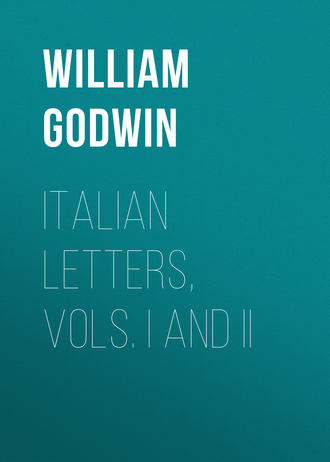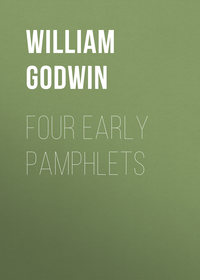 полная версия
полная версияItalian Letters, Vols. I and II
These things, my lord, I mention as considerations that have some weight with me, and ought perfectly to reconcile you to my unalterable determination. But these, I will ingenuously confess, are not the considerations that absolutely decide me. You cannot but sufficiently recollect the title I bear, and the situation in which I am placed. The duties of the marchioness of Pescara are very different from those by which I was formerly bound. Does it become a woman of rank and condition to fling dishonour upon the memory of him to whom she gave her hand, or, as you have expressed it, to cast back the scandal to which she may be exposed upon the author with whom it originated? No, my lord: I must remember the family into which I have entered, and I will never give them cause to curse the day upon which Matilda della Colonna was numbered among them. What, a wife, a widow, to proclaim with her own mouth her husband for a villain? You cannot think it. It were almost enough to call forth the mouldering ashes from the cincture of the tomb.
My lord, it would not become me to cast upon a name so virtuous and venerable as yours, the whisper of a blame. I will not pretend to argue with you the impropriety and offence of a Gothic revenge. But it is necessary upon a subject so important as that which now employs my pen, to be honest and explicit. It is not a time for compliment, it is not a moment for disguise and fluctuation. Whatever were the merits of the contest, I cannot forget that your hand is deformed with the blood of my husband. My lord, you have my sincerest good wishes. I bear you none of that ill will and covert revenge, that are equally the disgrace of reason and Christianity. But you have placed an unsuperable barrier between us. You have sunk a gulph, fathomless and immeasurable. For us to meet, would not be more contrary to the factitious dignity of rank, than shocking to the simple and unadulterated feelings of our nature. The world, the general voice would cry shame upon it. Propriety, decency, unchanged and eternal truth forbid it.
Yet once more. I have a son. He is all the consolation and comfort that is left me. To watch over his infancy is my most delightful, and most virtuous task. I have filled the character, neither of a mistress, nor a wife, in the manner my ambition aimed at. I have yet one part left, and that perhaps the most venerable of all, the part of a mother. Excellent, and exalted name! thee I will never disgrace! Not for one moment will I forget thee, not in one iota shalt thou be betrayed!
My lord, I write this letter in my favourite haunt, where indeed I pass hour after hour in the only pleasure that is left me, the nursery of my child. At this moment I cast my eyes upon him, and he answers me with the most artless and unapprehensive smile in the world. No, beloved infant! I will never injure thee! I will never be the author of thy future anguish! He seems, St. Julian, to solicit, that I would love him always, and behold him with an unaltered tenderness. Yes, my child, I will be always thy mother. From that character I will never derogate. That name shall never be lost in another, however splendid, or however attractive. Were I to hear you, my lord, they would tear him from my arms, and I should commend their justice. I should see him no more. These eyes would no longer be refreshed with that artless and adorable visage. I should no longer please myself with pouring the accents of my sorrow into his unconscious ear. Obdurate, unfeeling, relentless, unnatural mother! These would be the epithets by which I should best be known. These would be the sentiments of every heart. This would be the unbought voice, even of those vulgar souls, in which penury had most narrowed the conceptions, and repressed the enthusiasm of virtue. It is true, my lord, Matilda is sunk very low. The finger of scorn has pointed at her, and the whisper of unfeeling curiosity respecting her, has run from man to man. But yet it shall have its limits. My resolution is unalterable. To this I will never come.
My lord, among those arguments which you so well know how to urge, you have told me, that the cause you plead, is the cause of benevolence and charity. You say, that felicity would open our hearts, and teach our bosoms to overflow. But surely this is not the general progress of the human character. I had been taught to believe, and I hope I have found it true, that misfortune softens the disposition, and bids compassion take a deeper root. It shall be ever my aim, to make this improvement of those wasting sorrows, with which heaven has seen fit to visit me. For you, I am not to learn what is your generous and god like disposition. My lord, I will confess a circumstance, for which I know not whether I ought to blush. Animated by that sympathetic concern, which I once innocently took in all that related to you, I have made the most minute enquiries respecting your retreat at Leontini. I shall never be afraid, that the man, whose name dwells in the sweetest accents upon the lips of the distressed, and is the consolation and the solace of the helpless and the orphan, will degenerate into hardness. Go on, my lord! You are in the path of virtue. You are in the line that heaven chalked out for you. You will be the ornament of humanity, and your country's boast to the latest posterity.
FINIS1
This letter was written several months earlier than the preceding, but was intercepted by the marquis of Pescara.









